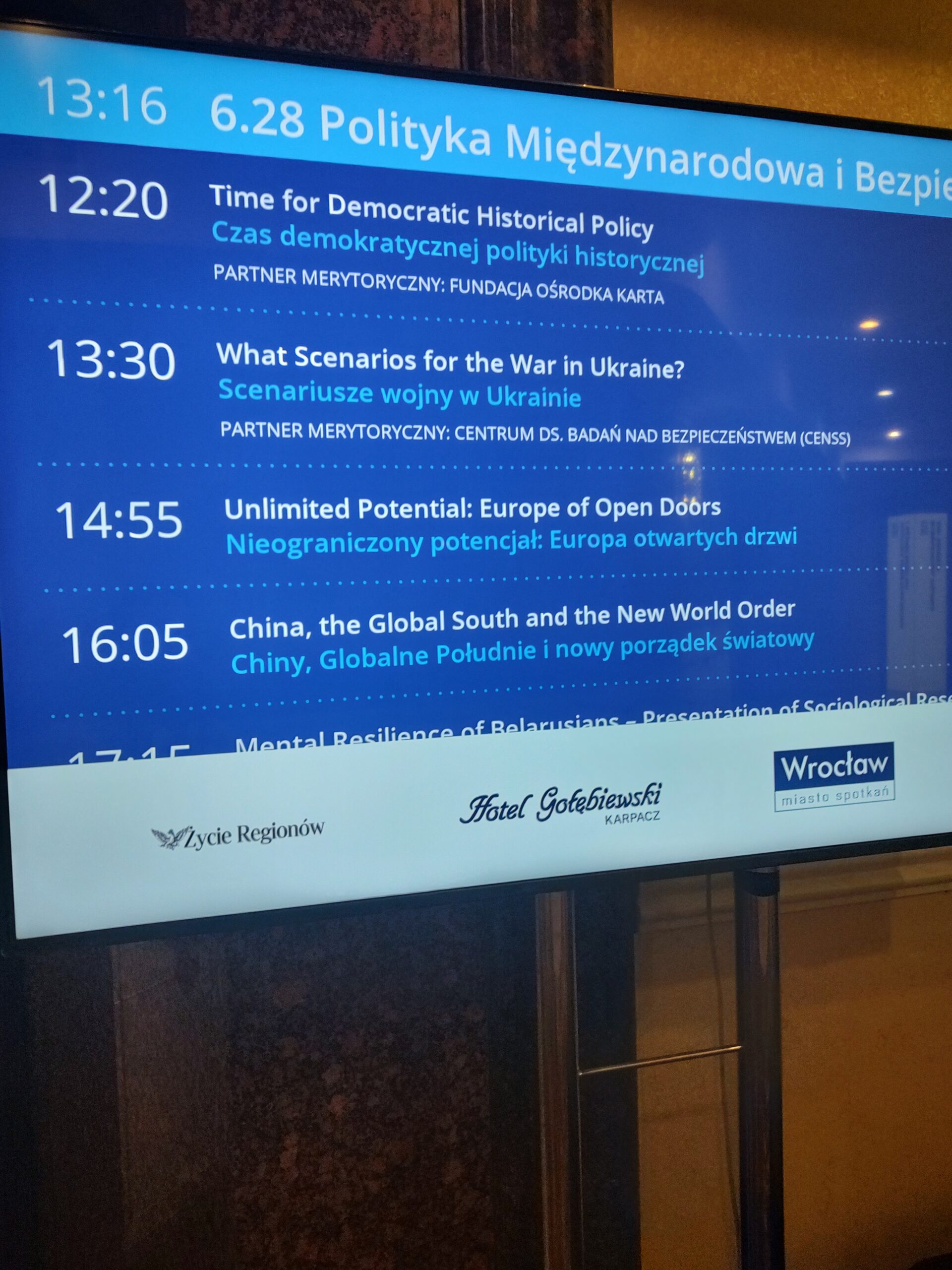On September 3–5, the annual Economic Forum took place in Karpacz, Poland, under the slogan “A Time for New Leaders: Shaping the Future Together.” This year, the CENSS Center for Security Studies served as an institutional partner for the event. Together with the forum team, CENSS organized a discussion titled “What Are the Scenarios for the War in Ukraine?”
The panel featured prominent speakers:
- Marek Budzisz, Senior Fellow at the Strategy&Future think tank and an expert on Russia and the post-Soviet East (Poland),
- Oleh Dunda, Member of the Ukrainian Parliament and the Committee on State Power, Local Self-Government, Regional Development, and Urban Planning,
- Maya Otaraashvili, Director of the Eurasia Program at the Foreign Policy Research Institute (FPRI) (USA),
- Daniel Rice, President of American University Kyiv, graduate of American West Point, U.S. infantry combat veteran, and special advisor to General Zaluzhnyi in 2022–23.
The discussion was moderated by Viktoria Voronina, Executive Director of CENSS.
One of the key issues discussed during the panel was the potential scenarios for ending the Russia-Ukraine war.
According to Maya Otaraashvili, Director of the Eurasia Program at the Foreign Policy Research Institute, the outcome of the war will largely depend on the results of this year’s U.S. presidential election. *”I believe next year will be critical and potentially decisive for the war in Ukraine. However, this will depend on who is elected President of the United States in November,”* the speaker noted.
She also expressed a positive view of potential peace negotiations as a tool to end the war but regretted that, in her opinion, the United States has not made sufficient efforts in this direction. In contrast, countries that maintain friendly relations with Russia, such as China, Brazil, and Turkey, are doing much more to facilitate negotiations.
“I believe it is very important for the war to be resolved through negotiations, and I think this should happen next year. I hope it will occur under the leadership or joint leadership of a Harris administration. I think it would be detrimental if any potential future negotiations were led by Putin’s allies. Do you think such negotiations would result in a fair outcome for Ukraine?” Otaraashvili remarked.
Maya Otaraashvili also mentioned one scenario often discussed in the United States, which suggests that “Ukraine might have to cede some territories, and some Russian military forces might remain on Ukrainian territory. However, in such a case, the U.S. would need to provide Ukraine with ironclad security guarantees, including but not limited to NATO membership.”
Oleh Dunda, a Member of the Ukrainian Parliament, reflecting on potential scenarios for ending the war, emphasized that the conflict extends beyond Ukraine’s borders:
“This is a war that has affected other countries, and the world will not be the same once it ends,” he stated.
According to MP Oleh Dunda, there are only two possible scenarios for ending the war.
The first scenario is if Russia wins the war. In this case, Ukraine would cease to exist, and Europe would no longer remain in its current state. *”This wouldn’t necessarily involve a direct invasion of Europe. It’s more about the emergence of a new hegemony capable of destroying anything it pleases,”* Dunda explained.
The second scenario is if Ukraine wins the war. In this case, Dunda believes Russia would face defeat and effectively collapse. He argued that strength is the cornerstone of an empire’s existence, and without it, the empire cannot survive in its current form. A victorious Ukraine would mean the end of a strong Russia, similar to what happened with the Soviet Union.
“This second scenario is the most favorable not only for Ukraine but also for the whole of Europe,” the MP emphasized.
Daniel Rice, former advisor to General Zaluzhnyi, has his own perspective on the scenarios for Ukraine’s war with Russia. He believes that Ukraine is engaged in a war of attrition and has every chance of winning, provided certain conditions are met.
“Can Ukraine win a war of attrition? Absolutely, I firmly believe so. Ukraine has the will to fight, which is the most important factor. They have talented soldiers and now possess some of the best Western systems in artillery, armored vehicles, infantry, and combat machines. What Ukraine needs more of are cluster munitions. Much of Eastern Europe already has these weapons. I suggest that they transfer as much of this weaponry to Ukraine as possible. If we provide Ukraine with sufficient quantities of the number one weapon against Russians—artillery—and supply the best ammunition, namely cluster munitions, Ukraine can and will win the war of attrition,” Rice stated.
Marek Budzisz, Senior Fellow at the Strategy&Future think tank, believes that the scenarios for ending the war depend primarily on the policies of Ukraine’s allies, and none of the current options appear optimistic.
“None of these scenarios are viable today. It is not about the determination of the Ukrainian people; it is about what the policies of Ukraine’s allies will be. Without their support, continuing the resistance is not impossible but becomes much more difficult. The United States has committed to supporting Ukraine, and backing away from this would be a strategic defeat for them. However, the U.S. lacks a strategy for victory. If their policy does not change, the most realistic scenarios are either a defeat in Ukraine or a controlled defeat,” Budzisz stated.
In his view, if the U.S. does not adjust its approach, Central European countries will be forced to develop a controlled alternative scenario to end the war. This would involve providing Ukraine with a system of guarantees—not through NATO, as that currently seems unrealistic, but via bilateral agreements, which are also highly challenging.
Budzisz also argued that the U.S.’s main strategy in this war appears to be to continue it as long as necessary to weaken Russia. “This strategy implies that the U.S. will support Ukraine as long as it is able to absorb Russian military power. If Ukraine’s capacity to do so is exhausted, the next countries to take on this role will be Central European states and those in the Eastern Partnership. This is a scenario that offers no chance for success in this confrontation,” he concluded.








